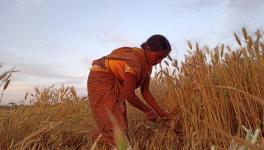‘Unjust Farm Laws will Increase Agribusiness’ Stranglehold’: US Farmers Extend Solidarity to Protests

Source: Financial Express
A group of 87 food advocacy organisations and farmers from the US has expressed its solidarity with the farmers’ protests against the Farm Laws which have been ongoing for close to three months at Delhi’s borders. Farmers from Punjab have been protesting against the laws since July last year.
The farmers’ agitation has also led to massive mahapanchayats – essentially large village council meetings – being organised in Haryana, Uttar Pradesh, Rajasthan, Punjab and in other states. One such maha rally in Barnala on Sunday reportedly attracted over two lakh farmers and workers.
“India’s farmers have mobilised to create one of the world’s most vibrant protests in history, camping on the outskirts of New Delhi for more than two and a half months,” their statement said. The signatories said they stood in solidarity with the farmers, as have others from across the world, against the “unjust farm laws that will increase agribusiness’ stranglehold over their food system.”
The statement also drew parallels to what had happened to agriculture in the US and what the farm laws in India could lead to, saying, “the US government has been eroding the concept of parity (similar to MSP in India) at home for decades.” Farmers from different states in India have been reiterating the same since the three laws were passed in controversial circumstances in September last year.
“Let us be clear: what the Indian farmers are enduring now happened in the U.S. almost four decades ago. The Reagan era furthered the farm crisis through deliberate federal policy changes, with systematic erosion of parity prices and other deregulatory efforts. ‘Get big or get out’ has been our government’s mantra. Farmers with the means to consolidate have been rewarded for growing monoculture commodities. Tribal nations and traditional producers as well as small farmers who have always practiced or shifted to diversified agroecological farming have effectively been subsidizing the U.S. agriculture sector. It is rare for these food producers to make a living without supplemental income. Unsurprisingly, farm suicides in rural America are 45% higher than the rest of the population,” their statement said.
Here is the statement in its entirety:
U.S. farmers and allied food justice advocates express our solidarity with the farmer protests in India against the unjust farm laws that will increase agribusiness’ stranglehold over their food system.1 India’s farmers have mobilized to create one of the world’s most vibrant protests in history, camping on the outskirts of New Delhi for more than two and a half months. Their rallying cry is to repeal the three unjust laws that were passed without their knowledge or consultation. We extend our solidarity to countless farmers who are peacefully and boldly standing up for their rights and dignity, with other farmers from across the globe.
One of the key demands of the movement is for farmers to receive a Minimum Support Price (MSP) — currently assured for just a few crops — for all produce, including vegetables, which are essential for healthy diets. This would ensure that farmers in India, already burdened by huge debts, receive a fair price for their produce. MSP is the price at which the Indian government also buys staple grains, like wheat and rice, from farmers for its public food programs so that the poor can access subsidized grains.2 While the Indian government only procures a small percentage for its food programs, the MSP is a key price signal to other traders in India, and it ensures that farmers receive a fair price for these specific crops.
We recognize the role of the U.S. government in creating the conditions that have led to these repressive laws. The U.S. has been a key opponent of India’s limited use of MSP at the World Trade Organization (WTO). The U.S., with Australia, Canada and European allies, has claimed that India’s MSP distorts trade.
But, that is not surprising: the U.S. government has been eroding the concept of parity (similar to MSP in India) at home for decades. There is an opportunity for the Biden administration to shift U.S. trade policy to allow other countries to support fair markets for their farmers and shift agricultural policy to ensure that our food providers make a living wage.
While the U.S. agricultural sector receives inordinately large support compared to many countries, access to that support remains inequitable. In particular, Black, Indigenous, Latino, Asian-Pacific and other people of color producers, who lack secure land tenure and are concentrated in vegetable and small -scale cattle sectors, have been excluded historically.3 Support flows to larger agribusiness farming operations instead of the independent family farmers whose voices we amplify.
Let us be clear: what the Indian farmers are enduring now happened in the U.S. almost four decades ago. The Reagan era furthered the farm crisis through deliberate federal policy changes, with systematic erosion of parity prices and other deregulatory efforts. “Get big or get out” has been our government’s mantra. Farmers with the means to consolidate have been rewarded for growing monoculture commodities. Tribal nations and traditional producers as well as small farmers who have always practiced or shifted to diversified
-
A comprehensive article explaining what the massive, historic farmers’ protests in India are about can be found here.
-
An overview to how the MSP impacts the various states of India can be found here.
-
Movements for indigenous self-determination with rallying calls for #LandBack, and visionary bills like the Justice for Black Farmers Act of 2020 reflect continuing need to redress these historical injustices in the U.S., similar to the advocacy of Adivasis, women and other farmers in India, who have suffered from generations of displacement.
agroecological farming have effectively been subsidizing the U.S. agriculture sector. It is rare for these food producers to make a living without supplemental income. Unsurprisingly, farm suicides in rural America are 45% higher than the rest of the population.
The WTO has indeed worsened an already unequal playing field between the Global South and Global North. What every nation-state can do, at the very least, is protect small farmers from deregulatory efforts, such as the three farm laws in India, that diminish the limited bargaining power that farmers have, pushing them off their farms. In the U.S., it is said that the previous administration’s agenda, “focused primarily around deregulation and increasing aid to commodity farmers while cutting food aid to needy families, [which] will have long-lasting implications.”
The Biden-Harris administration is off to a promising start, yet much work remains to be done on parity and environmental and racial justice in relation to food and agricultural policy domestically, as well as internationally. The U.S. government must stop prioritizing the interests of agribusiness over small farmers, abetting further corporatization of the food system here and in other countries. The U.S. must also endorse multilateral governance norms that will support India's transition to climate-resilient, biodiverse and water-conserving food systems that reach all producers. This would also mean harmonizing trade rules to include parity pricing and public crop procurement.
We have great respect for the unified struggles the farmers and farmworkers of Samyukt Kisan Morcha have built, and we stand with them. We urge both governments to support independent family farmers and localized food systems, ensuring food sovereignty and securing the livelihoods of millions who are the bedrock of its food security and nutritional wellbeing.
Statement Endorsed By:
-
A Growing Culture
-
Abanitu Organics
-
AFGE Local 3354
-
Agri-Cultura Cooperative Network
-
Agricultural Justice Project
-
Agroecology Commons
-
Agroecology Research-Action Collective
-
Alabama State Association of Cooperatives
-
Alianza Nacional de Campesinas
-
Alliance for Progressive South Asians (Twin Cities)
-
American Sustainable Business Council
-
Americana World Community Center
-
Ancestor Energy
-
Association for Farmers Rights Defense, AFRD Georgia
-
Black Farmers & Ranchers New Mexico/National Latino Farmers and Ranchers Trade Association
-
Buttermilk Falls CSA
-
Center for Regional Agriculture Food and Transformation
-
CoFED
-
Community Agroecology Network
-
Community Alliance for Global Justice
-
Community Alliance with Family Farmers
-
Community Farm Alliance
-
Community Food and Justice Coalition
-
Compassionate Action for Animals
-
Disparity to Parity
-
Earth Ethics Action
-
East Michigan Environmental Action Council/Cass Commons
-
Echo Valley Hope
-
Ecologistas en Acción
-
Ecosocialist Working Group, International Committee, Democratic Socialists of America
-
Fair World Project
-
Family Farm Action Alliance
-
Family Farm Defenders
-
Farm Aid
-
Farm and Ranch Freedom Alliance
-
Farmers On The Move
-
Farmworker Association of Florida
-
Ground Operations
-
Health of Mother Earth Foundation
-
i4Farmers
-
Imagining Transnational Solidarities Research Circle
-
Institute for Agriculture and Trade Policy
-
Institute for Earthbound Studies
-
Just Transition Alliance
-
Land Core
-
National Latino Farmers & Ranchers Trade Association
-
National Family Farmers Coalition
-
Natures Wisdom
-
NC Climate Justice Collective
-
NeverEndingFood
-
North Carolina Association of Black Lawyers Land Loss Prevention Project
-
Northeast Organic Farming Association — Vermont
-
Northeast Organic Farming Association, Mass. Chapter
-
Northeast Organic Farming Association-Interstate Council
-
OPEIU 39
-
Peoples Architecture Commonwealth
-
Pesticide Action Network North America
-
Philadelphia Community farm
-
Real Food Media
-
Regenerative Organic Alliance
-
Regenerative Rising
-
Rural Advancement Foundation International-USA
-
Rural Advancement Fund of the National Sharecropper Fund
-
Rural Coalition
-
Rural Development Leadership Network
-
Rural Vermont
-
Safe Food and Feed Foundation
-
Santa Cruz Permaculture
-
Science for the People
-
Science for the People — Twin Cities
-
Seeds for All
-
Shaping Change Collaborative
-
Sierra Club-USA
-
Southeastern African-American Farmers' Organic Network
-
Steward Foundation
-
Texas Drought Project
-
The Carbon Underground
-
United People Community Organization, Market, and Farms
-
University of MN Food Recovery Network
-
Uprooted & Rising
-
US Food Sovereignty Alliance
-
Utopia Cornucopia
-
Vision for Change Foundation
-
Vitis and Ovis Farm
-
Washington Biotechnology Action Council
-
Wisconsin Network for Peace and Justice
-
Women’s Environmental Institute
Get the latest reports & analysis with people's perspective on Protests, movements & deep analytical videos, discussions of the current affairs in your Telegram app. Subscribe to NewsClick's Telegram channel & get Real-Time updates on stories, as they get published on our website.
























